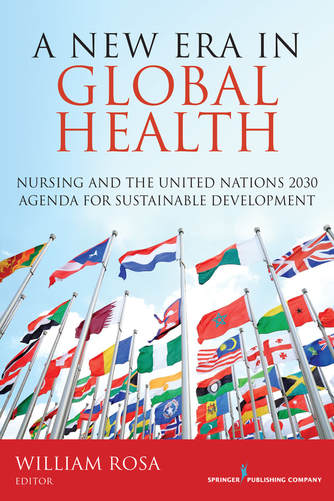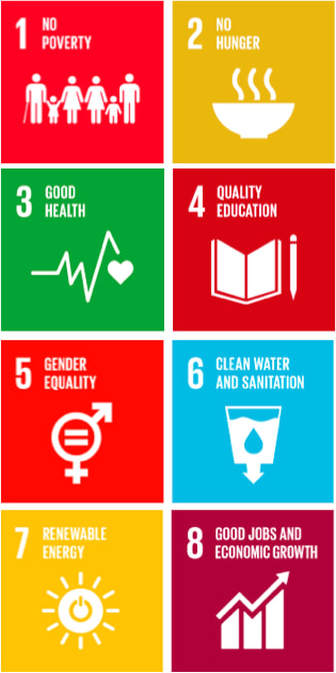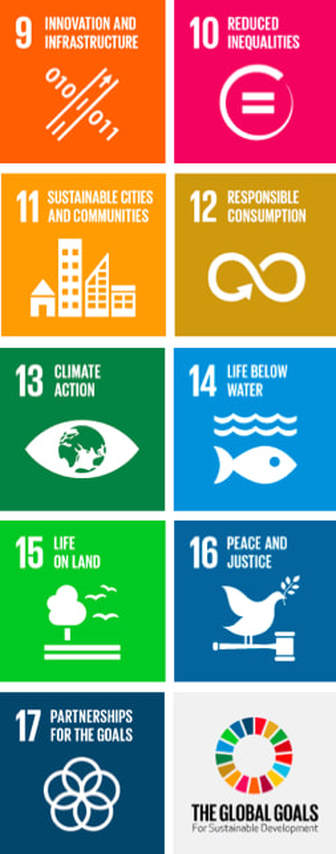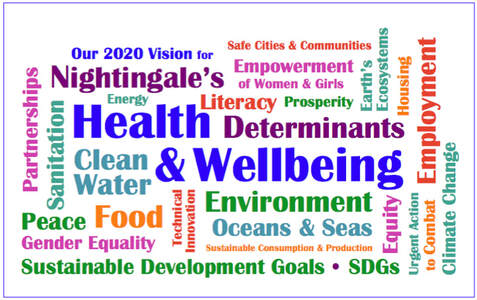To Create Emergent & Evolutionary Possibilities...
|
“We must dispel the myths that limit us and support each other
in the development of globally relevant literacies in leadership and advocacy.” |
|
At our moment in time—when globalization has become both a reality and an increasing challenge—a most timely book 'A New Era in Global Health: Nursing & the United Nations 2030 Agenda for Sustainable Development' is now available from the Springer Publishing Company.
This book aptly gathers the inter-connectedness of factors needed to understand ‘global health’ and to appreciate, support, engage and empower the global body of 19 million+ nurses and midwives who are the foundation on which global health is attempted and ultimately achieved. Deriving leading-edge content from the breakthrough UN Sustainable Development Agenda—the official agenda to achieve 17 ‘Global Goals’ for Sustainable Development (UN SDGs) by 2030—Editor William 'Billy' Rosa identifies and gathers these ‘Goals’ into a framework for appreciating and challenging the world’s nurses to be more of who we already are. He opens with a most-thought-provoking stance: “A New Era in Global Health” is an opportunity to create emergent and evolutionary possibilities for nursing, health care and planetary health using the UN 2030 Agenda as our guiding framework…. We must dispel the myths that limit us and support each other in the development of globally relevant literacies in leadership and advocacy.” |
|
How “am I an integral component of the transformative vision articulated by the Sustainable Development Agenda?” Combining a comprehensive review of the UN's Sustainable Development Agenda with the contributions of 40 nursing leaders from across the world, Mr. Rosa brings readers a solid scope on which to span across the wide-ranging issues that shape global health while, at the same time, to discover the past, present and future of nursing's significant contributions to these same issues. As well, he shows readers their own opportunities to become— more than observers—pro-active participants in the global difference nurses continue to make. He asks readers to reflect, “In what ways am I an integral component of the transformative vision articulated by the Sustainable Development Agenda?” One of the key strategies Mr. Rosa provides is to call for a paradigm shift in the way we see such global-level goals and the way nurses see and value ourselves. “to maximize nursing contributions…
to ensure the global betterment of humanity.” “The SDGs—and the trans-national efforts being rallied to ensure their achievement—remind humanity that we are, indeed, interconnected and reliant on each other not only for today, but also for tomorrow.... This knowledge carries with it great responsibility to maximize nursing contributions beyond outdated and paternalistic systems to ensure the global betterment of humanity.”
“a new lens through which we view
ourselves, our communities, our patients, our colleagues and our students.” Upon establishing these two key premises, Mr. Rosa weaves in the contributions of numerous colleagues. He begins by quoting a leading nurse activist and educator, Dr. Holly K Shaw, NIGH's long-time UN NGO Representative working at United Nations Headquarters in New York City. “For me, the most important issues are that global nursing is not about mission trips or international travel. Global nursing involves every nurse everywhere, at home and abroad, in our own indigenous villages in Uganda, Cambodia, New York and Indiana. It is a (new) lens through which we view ourselves, our communities, our patients, our colleagues and our students.” As well, Mr. Rosa and Dr. Shaw team-up on a related chapter introducing the concept of 'Global Citizenship' and its relevance to nurses, nursing and to nursing's collaboration with inter-professional colleagues. “Ultimately, global citizenship is about allowing ourselves to evolve past self-limiting definitions and embrace partnerships that nurture health and wellness for everyone.” |
Mr. Rosa then develops a section focused on how the history of nursing has participated in the development of these Global Goals. In her chapter about the combined history of the United Nations itself and how nurses have come to interact within the United Nations ‘family,’ NIGH's Dr. Deva-Marie Beck reviews the less-known details of how nursing’s modern founder, Florence Nightingale. She actually participated in crafting the original international peace treaty—the First Geneva Convention—that directly led to the founding of the League of Nations and, ultimately, to establishing the United Nation itself. “Following her own profound experiences while serving battlefield-wounded and dying soldiers during the Crimean War (1854-1856), Nightingale became an expert devoted to discovering and establishing peacekeeping efforts. She also knew—from her own work as a nurse—that war is a major contributor to disease and that the absence of war is only a fraction of what is needed to achieve and sustain a peaceful, healthy world.”
|
Dr. Beck continues, “Nightingale anticipated the interconnected concerns we readily see, today, as sustainable development milestones…. She called for and worked to achieve better conditions and rights for women, children, the poor and hungry, and for better educational programs for people marginalized by culture and geography. She identified environmental health determinants, such as clean air and water, better homes, nutrition and sanitation and social health determinants such as poverty, education, human rights, family
|
relationship and employment.“ The ‘word cloud’—seen here on the right—was developed by NIGH’s core team to illustrate these Nightingale-leading-edge ideas and re-printed, in “A New Era in Global Health.”
|
“...it would take 100 to 150 years for the kind of nurses and nursing she envisioned.” |
Another chapter—contributed by NIGH’s Dr. Barbara Dossey, Dr. Beck, Dr. Phalakshi Manjrekar and NIGH Advisor Sarah Oerther—also outlines the relevance of nursing’s Nightingale history to the today’s Sustainable Development Agenda, ”The founder of modern secular nursing—and the first nurse theorist—began to write in the 1870s that it would take 100 to 150 years for the kind of nurses and nursing she envisioned. She left us—as 21st century Nightingales--with an expansive worldview of how to carry forward her vision of health, including what we would call 'health determinants.”
|
|
Mr. Rosa further develops the present reality of nursing's contributions to the world. For example, he includes a chapter crafted by leaders recently affiliated with the International Council of Nurses (ICN), Dr. Frances Hughes, Dr. Judith Shamian and Elizabeth Holguin, a nursing doctoral student who has collaborated with the ICN. In their chapter, these leaders appreciate that “Nurses bring unique attributes to leadership positions owing to their understanding of health, human-centered care and health systems across the entire spectrum of care. As providers with an influential role in advocating for the health of individuals and communities, nurses are essential and well-positioned to lead and promote a healthier world for present and future generations.” |
|
|
After providing 17 separate chapters to introduce the substance of each of the UN's Sustainable Development Goals, Mr. Rosa then collaborates to shape an in-depth chapter--”Global Nursing Wisdom: Notes from the Field”—focused on examples of each of these SDGs—and details about how these are achieved—from nursing leaders across the world: Julie K. Anathan; Dr. Busisiwe Rosemary Bhengu; Dr. Olivia Bahemuka, Kelly Burke, Maureen E. Connell, Dr. Carole Ann Drick, Dr. Helen Ewing, Dr. Lynn Keegan, Susan Luck, Dr. Phalakshi Manjrekar, Dr. Patricia Moreland; Jasintha T. Mtengezo and Deborah Wilson. |
This highlighted quote weaves their separate SDG-threads into one fabric of understanding: “In many ways, sharing our experiential knowledge with health care colleagues, students and the public is a moral requisite of nursing—a responsibility to elevate the profession, inform the collective about global concerns confronting each of us and unify the broader community of nurses and midwives.”
This highlighted quote weaves their separate SDG-threads into one fabric of understanding: “In many ways, sharing our experiential knowledge with health care colleagues, students and the public is a moral requisite of nursing—a responsibility to elevate the profession, inform the collective about global concerns confronting each of us and unify the broader community of nurses and midwives.”
|
A further example of this inter-sectoral understanding is developed by NIGH's Dr. Manjrekar who also serves as a Director of Nurses and a distinguished Member of the Board of Management (Trustees) for the major Mumbai Hinduja Hospital & Medical Research Centre. “We must continue to bring a nursing sensibility focused on procuring human dignity, ensuring equality in care, creating healing environments, utilizing a holistic approach that includes economic considerations, and maximizing our potentials in policy and governmental forums in order to aid our respective nations and global village in realizing economic and, therefore, human equity.”
|
“We must continue to bring nursing sensibility .... to aid our respective nations & our global village in realizing economic and, therefore, human equity.” |
|
“Playing a prominent role
in the global agendas of our time is critically important and essentially non-negotiable...” |
Included in his final wrap-up chapters, William Rosa introduces the ‘Global Advisory Panel on the Future of Nursing as Exemplar’ (GAPFON). Here he features leaders from the Honorary Nursing Society Sigma Theta Tau International (STTI), co-authors Dr. Hester C. Klopper; Christine M. Darling, Cynthia Vlasich, Dr. Cathy Catrambone and Dr. Martha Hill. Their reflections include these insights and the challenges facing us—as a global nursing community: “Nurses make up 70% of the health care workforce, yet we often see that our voice is silent…. Playing a prominent role in the global agendas of our time is critically important and essentially non-negotiable, more and more so since the acceptance of the Sustainable Development Goals by all member states of the United Nations in 2015.” |
This is a significant, keenly relevant book that contributes
to nursing’s quintessential leadership trajectory across the 21st century.
to nursing’s quintessential leadership trajectory across the 21st century.
|
Even while these above in-depth and challenging ideas are featured in this book review—many many more nursing leader authors are also included in William Rosa's 'A New Era in Global Health: Nursing and the United Nations 2030 Agenda for Sustainable Development.' These include: Dr. Sarah Abboud; Dr. Suellen Breakey; Dr. Linda Evans; Dr. Joyce Fitzpatrick; Dr. Sarah Horton-Deutsch; Dr. Ann E. Kurth; Dr. Jeanne M. Leffers; Dr. Tamara H. McKinnon; Dr. Afaf Ibrahim Meleis; Dr. Karen H. Morin; PhD Candidate Melissa T. Ojemeni; nurse-leader Linda Ridge; Dr. Allison P. Squires; Dr. Michele J. Upvall and the distinguished and beloved nursing theorist Dr. Jean Watson. |
“...contributing to nursing’s quintessential leadership trajectory
across the 21st century.” |
William Rosa completes his work with a chapter devoted to and inspired by the vision of Planetary Health, noting that this “moves us from a reference to people and global health outcomes—in terms of statistical data—toward a deeper wisdom related to interconnectedness, the intention and purpose for our work as global nurses, and the ethical considerations that drive and guide us, both personally and professionally.”
|
“...toward a deeper wisdom related to interconnectedness, the intention
and purpose for our work as global nurses, and the ethical considerations that drive and guide us, both personally and professionally.” |
Image Credits:
• Graphic Cover of ‘A New Era in Global Health’ from Springer Publications.
• Left-posted double line of UN SDG logos are used with attribution to UN.org Guidelines.
• 'Nightingale's Health Determinants' Word-Cloud from NIGH's original archives.
• Left-posted double line of UN SDG logos are used with attribution to UN.org Guidelines.
• 'Nightingale's Health Determinants' Word-Cloud from NIGH's original archives.




